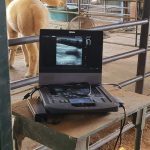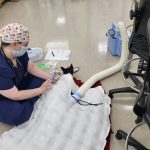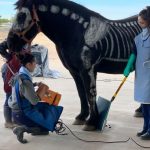 Yuba College Veterinary Technology Program
Yuba College Veterinary Technology Program
Working Farm Provides Hub for Hands-on Learning at Yuba College
For learners in Yuba College’s Veterinary Technology program, the idea of a “classroom” is something different than the typical rows of students staring at their screens.
These future vet techs feel more at home in a pasture or a calving pen, trading laptops for lead aprons as they work on-site at Yuba College’s very own farm on the Marysville campus.
“We have large animals on the college property that the students are able to work with and care for,” says Brittney Strong, a Registered Veterinary Technician (RVT) and instructor for Yuba College’s Vet Tech program. “The amount of hands-on training that our program ensures [is unique].”
Strong’s students rotate through a farm care shift schedule, experiencing multiple aspects of the vet tech business. Typically, students spend anywhere from two to six hours every week “on the farm,” working directly with the animals.
This hands-on engagement opens doors to a world of opportunity, according to the instructor, and makes the Yuba College program a one-of-a-kind destination for tactile learners. The program offers high-tech, high-impact education, “not only through our vigorous internship program, but also the on-campus surgery days in their second year and farm visits throughout their time at Yuba College.”
The experiential learning doesn’t stop there. From trapping and releasing stray cats, to performing bloodwork and wellness checks on calves, students in Yuba College’s Vet Tech program are gaining the kind of versatile, real-world experience required to become successful animal care professionals.
“Veterinary technology, by definition, is hands-on,” says Dr. Kyle Mathis, Director of the Yuba College Veterinary Technology program and practicing veterinarian. “A veterinary technician’s day is probably more hands-on than the veterinarians.
“We teach our students these hands-on tasks — everything from gently obtaining a blood sample from a pet mouse, to obtaining radiographs on a 1,500-pound horse.”
Powered by Strong Workforce Program (SWP) funding, the College managed to obtain essential resources like industry-standard diagnostic imaging equipment, surgery tables, oxygen concentrators, and multiparameter vital monitors. The equipment came in handy last year as students performed a trap and release project for a colony of 25 stray cats on the Yuba College campus.
Along with neutering and spaying the feral felines, students administered vaccinations, deworming medication, and applied flea treatment before releasing them.
“We’re trying to mimic real life scenarios in our classroom for the students,” explains Amber Kuykendall, Veterinary Technology Specialist and instructor in the Yuba College program.
The trap and release project is just one example of the countless practical experiences these vet tech students receive, thanks to the dynamic program. Other opportunities include annual vaccine and microchip clinics for pets in the community, as well as collaborations with two local shelters to perform spay and neuter procedures.
“[Students] get a variety of hands-on experiences with every species that’s actually required in essential skills,” says Kuykendall. “Last week, we went to the Sacramento Police Department and worked on their horses. The week before that, we went to nearby Tollcrest Dairy, and collected blood from baby calves.”
Strong’s students recently paid a visit to a local farm to help with veterinary care for their livestock as part of her Large Animal Medicine and Nursing course. The group also attended a local Wagyu Beef ranch where students practiced moving herds of cattle through the pasture and working facilities.
“We traveled to Grass Valley and were able to help a grass-fed lamb, goat and beef producer treat and give preventative measures to their goat herd,” recalls Strong. “Additionally, they were able to vaccinate, ear tag, and give oral boluses to the cattle. It was amazing!”
The Yuba College program is the most northern veterinary technology program in California, featuring curriculum accredited by the American Veterinary Medical Association Committee on Veterinary Technician Education and Activities (AVMA CVTEA). Accreditation ensures that students are receiving the most up-to-date standards of veterinary care. Vet techs-in-training experience a wide range of practice on a variety of animals, learning how to perform standard procedures like X-rays, blood collection, IV insertion, catheter placement, and anesthesia protocols.
And thanks to valuable SWP funding, students gain this training with industry-grade equipment and tools they are likely to encounter out in the field, including high-quality anesthesia machines, fluid pumps, and multiparameter vital monitors.
“We have a lot of expensive equipment you would normally find in a veterinary hospital,” says Kuykendall. “We want [to provide] students hands-on training with that equipment that they will actually be using in some of their workplaces.
“It’s amazing to have these opportunities.”
When possible, veterinary hospitals often opt to switch from scalpels to surgical lasers. The treatments performed with the tool can be done with less redness, bleeding, and swelling, leading to less pain for the animal and faster recovery times. Thanks to Yuba’s program, students get the opportunity to learn on the cutting-edge surgical laser, preparing them for anything they might experience while working in a veterinary care facility.
“We do not want students to be at a loss if they are hired to work at a clinic that uses equipment such as a surgical laser, only to find they did not know anything about laser set-up, calibration, maintenance, and safety,” explains Dr. Mathis.
Meanwhile, the immersive program aims to ensure students are ready to land versatile animal care positions at veterinary facilities as vet techs and care for animals large, small, and everything in between. Students also have the option to move into additional animal care positions, including working as animal control officers, wildlife rehabilitation professionals, animal laboratory technicians, and more.
 “Being a community college, it makes it affordable for the students, because unfortunately the pay rate for veterinary technicians is definitely not where it should be,” expresses Kuykendall. “It’slow for the skill set that they need.”
“Being a community college, it makes it affordable for the students, because unfortunately the pay rate for veterinary technicians is definitely not where it should be,” expresses Kuykendall. “It’slow for the skill set that they need.”
Annual pay for veterinary technicians is about $54,190 in California, according to the Occupational Information Network (ONET). However, Kuykendall emphasizes the importance of encouraging her students to advocate for themselves and their wages as they build up their careers.
“I’m trying to produce the best veterinary technicians for their money [by] investing into our program,” says the passionate specialist. “But also, so that they can advocate for higher wages for themselves, so they have the skill level in order to do that.”
For Strong, who sees her students improve on a daily basis thanks to the program’s access-first approach, there’s little question that these aspiring animal professionals will be successful in the future:
“I am incredibly blessed to be part of such a strong and supported program here at Yuba College and can’t wait to see what the future holds!”
Sources:
https://www.onetonline.org/link/localwages/29-2056.00?st=CA
May 2024
 Yuba College Veterinary Technology Program
Yuba College Veterinary Technology Program